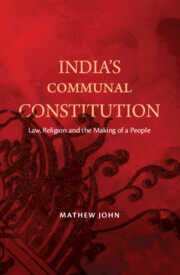Introduction
Published online by Cambridge University Press: 05 August 2023
Summary
Constitutions are statements of ambition. They are the pathways along which a political community envisions its hopes and aspirations. Over time, constitutions are also maps of failure and frustration. This book identifies one such constitutional failure, which it terms India's Communal Constitution. The Communal Constitution picks out a tendency in the Constitution to cast the identity of the Indian people along religious lines. Needless to say, this tendency gnaws at the heart of Indian constitutionalism, the liberal promise of equal liberties. Therefore, describing the grasp of the Communal Constitution, this book examines the manner it might be best understood alongside the Constitution's aspiration to forge a liberal and secular polity.
Outline of the Problem
To elaborate the communal orientation of the Indian Constitution and the drag it exerts on its liberal goals, a few distinctions and clarifications are useful to kick-start the discussion. In studies on communal tendencies in Indian constitutional politics, a standard point of departure has been the rise of Hindu nationalism over the last century, and especially in the period after the rise of the Ram Janmabhoomi–Babri Masjid dispute. These studies examine the phenomenon of Hindu nationalism in Indian public life and the extent to which it has undermined constitutional commitment to secular ideals. By extension, these studies are a comment on the inability of the broadly liberal and secular consensus embodied in the Constitution to hold its own against its adversaries.
In relation to the rise of religious nationalism, some scholars have suggested that the religious and group-oriented character of Indian society has not been well disposed to liberal secular norms. In turn, it could be argued that these dimensions of Indian society have not facilitated a robust defence of its liberal constitutional state. Whatever stance one takes in relation to these arguments, it is important to note that they seek to explain socio-cultural forces that exert an external influence on constitutional institutions and values. In other words, these arguments on the working of constitutional institutions foreground forces like Hindu nationalist mobilisation as influences that are analytically distinct and largely external to the liberal secular organisation of the Indian Constitution.
The sway of Hindu nationalist mobilisation has never been more pressing on India's liberal constitutional state as parties vowing allegiance to it hold the levers of state power in many parts of contemporary India.
- Type
- Chapter
- Information
- India's Communal ConstitutionLaw, Religion, and the Making of a People, pp. 1 - 16Publisher: Cambridge University PressPrint publication year: 2024

